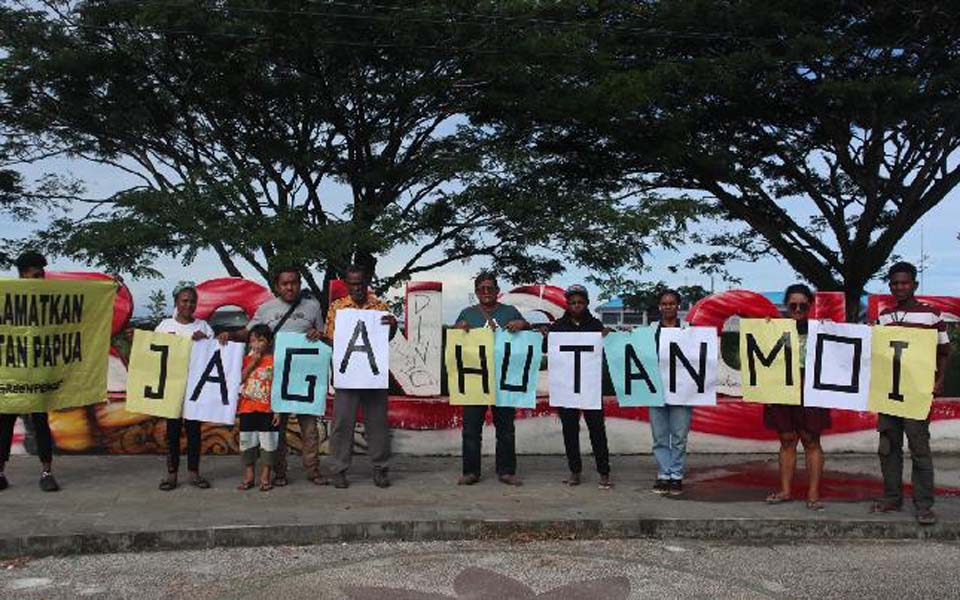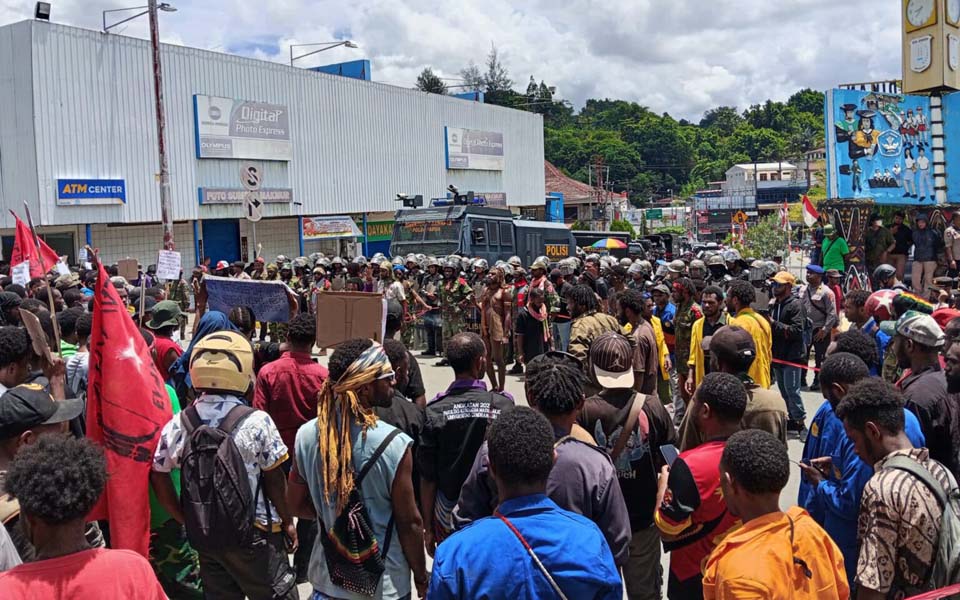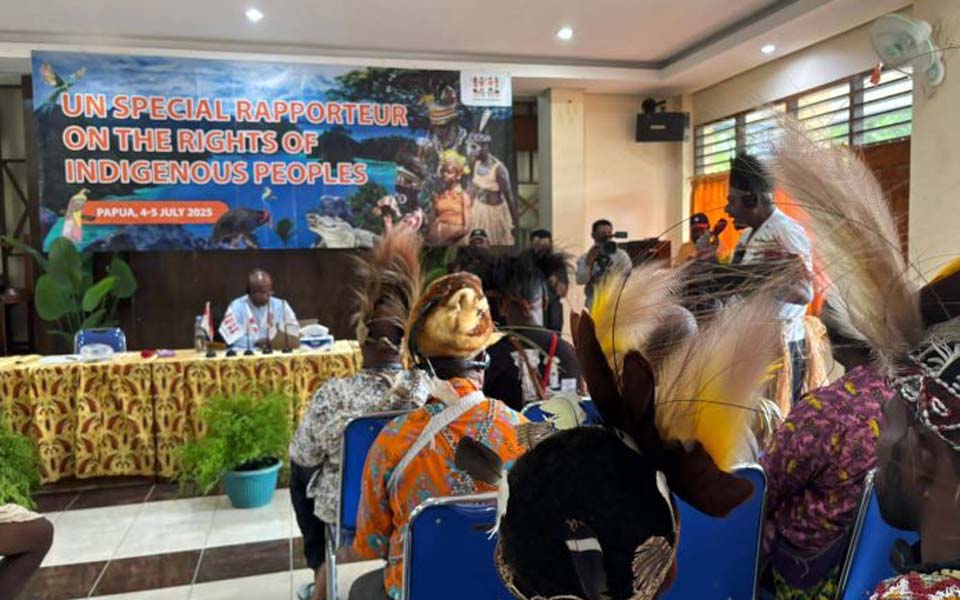Reiner Brabar, Sorong – Indonesian social media has been enlivened by the call "All Eyes on Papua" which has gone viral over the last few days and attracted an extraordinary amount of attention.
The campaign has appeared as a form of support for the indigenous people of the Awyu tribe in Boven Digoel regency, South Papua Province, and the Moi Tribe in Sorong regency, Southwest Papua Province, who are currently fighting against their customary forests being converted into palm oil plantations.
Indigenous peoples of the Awyu and Moi tribes filed a lawsuit against the government and oil palm companies in order to defend their customary forests. The lawsuit has now reached the appeal stage at the Supreme Court.
Wearing traditional clothes, the Awyu and Moi tribes together with the environmental activists held a peaceful action on Monday May 27 last week, which was marked by traditional prayers and rituals.
"We came here after travelling a distance that was long, complicated and expensive from the land of Papua to Jakarta to ask the Supreme Court to restore our rights that have been expropriated by revoking the palm oil company's permit that we are currently fighting against", said environmental activist Hendrikus Woro from the Awyu tribe.
Their call for the Supreme Court to provide legal sovereignty for indigenous peoples was also conveyed by representatives of the indigenous peoples of the Moi Sigin, Fiktor Klafiu.
"Customary forests are where we hunt and gathering sago, forests are pharmacies for us, our needs are all in the forest. If our customary forests are lost, where else will we go?", said Klafiu.
Involve indigenous communities in development
Vice President KH Ma'ruf Amin has responded to the problems of indigenous peoples which has been in the spotlight though the hashtag "All Eyes on Papua" by saying that in future developments, regional governments must communicate with traditional leaders and the community.
"So no kind of conflict or misunderstanding occurs as happened before", Amin said in a press release during a working visit to Southwest Papua on Thursday June 6.
The Vice President, who is also the Head of the Papua Special Autonomy Development Acceleration Steering Agency (BP3OKP), said that in approaching the tribal chiefs it is necessary to avoid policies that have a negative impact on the livelihoods of Papuan indigenous peoples.
"Perhaps before there was a lack of communication, in the future it must be well communicated", he said.
Problem will be resolved this week
Papua regional police chief (Kapolda) Mathius Derek Fakhiri said that he has sent a team to a number of locations to respond to the problems of indigenous peoples that have been in the spotlight through the hashtag "All Eyes On Papua". Fakhiri stated that he would deal with the problems seriously.
Fakhiri claimed that together with the Mappi and Boven Digoel district police chiefs they have sent officers from the Special Crimes Detectives Directorate to personally monitor the problems that are occurring. Boven Digoel will be of special concern.
"I hope that we can resolve it this week. So that the communities can find a solution. Hopefully there is a meeting point between indigenous peoples and the government, and the companies", said the police chief on Tuesday June 4.
Groups that don't want Indonesia to progress
As broadcast on YouTube, Investment Minister and head of the Investment Coordinating Board (BKPM) Bahlil Lahadalia claimed that he understands there will be protests when there is development in the regions. However, he believes that the protest usually came from parties who did not want Indonesia to progress.
“Why do people look at Papua like this? On account of me being the head of the task force for making sugar cane and food? I understand very well, there are some groups or other countries that don't want Indonesia to progress", Lahadalia claimed during a press conference at the BKPM building on Friday June.
Lahadalia asked the public not to be trapped by groups of people who do not want Indonesia to progress. He said that the forests in Merauke are not customary forests that cover forest concession rights (HPH).
HPHs are the right to exploit a forest including logging activities, forest maintenance, processing and marketing of forest products in accordance with the company's work plan according to applicable regulations and based on the principle of forest sustainability and the company's principles.
"Be assured that we love this country, my concept for building Papua is what is built is so indigenous communities who own our territory are the subjects and objects", he said.
Lahadalia related how he traveled around forest areas for two-and-a-half hours with the regent and the governor. According to Lahadalia some forest areas are former Other Use Areas (APL) or areas for other purposes.
Lahadalia, who is also chairperson of the Sugar and Bioethanol Self-Sufficiency Task Force, is aiming for Papua to become self-sufficient in sugar, thereby producing bioethanol and green energy.
"So the country gets the results it needs regarding rice, related to ethanol, related to sugar, but also the ordinary people and entrepreneurs can grow together."
Palm oil companies destroy forests
Greenpeace Indonesia forest campaigner Asep Komaruddin emphasised the importance of returning customary forests to their original owners, namely the Awyu and Moi indigenous communities.
Komaruddin stated there are three big losses if this conflict continues, namely the loss of living space for indigenous peoples, the loss of Papua's endemic biodiversity and increased carbon emissions which will worsen the climate crisis.
"The presence of palm oil companies destroys forests which are a source of livelihood, culture and knowledge for indigenous peoples", he said.
Meanwhile, Indonesian Forum for the Environment (Walhi) national forest and garden campaign manager Uli Arta Siagian said this conflict shows the government's lack of respect for the rights of indigenous peoples.
He said there was no process of Free and Prior Informed Consent (FPIC) conducted by the company, which should be a precondition for issuing an environmental permit.
Siagian hopes that the "All Eyes on Papua" campaign can encourage policy changes that better respect the rights of indigenous peoples. "We hope that this campaign can change the court's ruling or government policies at both national and regional levels", said Siagian.
Photo opportunities mark Environment Day
According to the Papua Youth and Student Alliance Caring for Forests and Indigenous Peoples' Rights (AMPERAMADA), the Merauke People's Movement Rejecting Sugar Cane (GERTAK), the Malamoi Movement and the South Papua Nature Concern Youth and Student Community (KOMPPAS), the problems faced by the Awyu and Moi tribes are a small picture of the theft of indigenous people's land. Because, there are millions of hectares of forest that have been given over to palm oil plantations in the land of Papua.
Regarding this issue and coinciding with World Environment Day on June 5, an alliance of civil society groups spread across Sorong, Southwest Papua province, Jayapura, Papua province, Merauke and South Papua province held photo opportunities at a number of central points of public concern.
The photo opportunity actions aim to be a form of support for the Awyu and Moi tribes who are pursuing an appeal with the Supreme Court. These actions are also in order to urge the government to immediately stop granting permits to companies that are grabbing land and destroying customary forests in the land of Papua.
They also called on the government to immediately review and revoke all mining, plantation and forestry permits that damage the environment and expropriate the rights of the indigenous Papuan peoples, and to immediately restore the rights of the Papuan indigenous peoples that have been violated.
Recognise and strengthen customary areas
Greater Sorong Nusantara Traditional Community Alliance (AMAN) daily management board (BPH) chairperson Feki Wilson Mobalen said that AMAN had found a number of cases of the confiscation or transfer of customary areas where the licensing process did not comply with the law.
Based on these finding, AMAN is urging an evaluating all permits that violate the law, both customary and formal law. The government can take administrative action in the form of stopping or revoking all licensing levels.
"The government must also follow this up through measurable and fair administrative actions by removing the customary territories of the Papuan indigenous people which are included in the concession", said Mobalen in Sorong, Southwest Papua.
AMAN has recorded a number of cases of violations of community rights by corporations in Papua, namely the Moi tribe in Sorong, the indigenous people of Konda district, South Sorong, and the Woro clan of the Awyu tribe in Boven Digoel.
In addition to this, there are also allegations of customary lands violations against the Malind tribe in Merauke district, South Papua province, and in the Grime Nawa Valley, Jayapura district, Papua province.
AMAN is also appealing to the government to evaluate all permits that violate the law, both customary as well as formal law.
“The government can take administrative action in the form of stopping or revoking all levels of permits. The government must also follow up on this through measurable and fair administrative actions by removing Papuan indigenous people's traditional areas from concessions", he said.
Mobalen hopes that the government can recognise the rights of indigenous peoples over their lands and forests in accordance with applicable laws.
In addition to this, the relevant ministries and state institutions can accelerate the determination or confirmation of customary community territories, both customary land and forests.
"Accelerating this determination is a constitutional action that must be carried out in order to realise social justice as well as fulfill human and environmental rights", asserted Mobalen.
[Translated by James Balowski. The original title of the article was "Kata Para Tokoh dan Aktivis Terkait Gerakan “All Eyes on Papua”".]
Source: https://suarapapua.com/2024/06/09/kata-para-tokoh-dan-aktivis-terkait-gerakan-all-eyes-on-papua/















